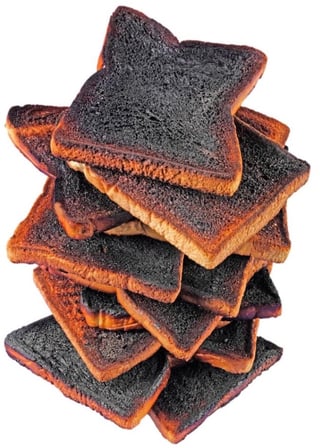 A new warning about the health risks of eating toasted starchy foods such as browned potatoes, burnt toast and some cereals draws a link between a chemical called acrylamide and an increased risk of cancer.
A new warning about the health risks of eating toasted starchy foods such as browned potatoes, burnt toast and some cereals draws a link between a chemical called acrylamide and an increased risk of cancer.
Acrylamide is what makes bread and potatoes turn golden in color when fried, baked, toasted or roasted. The compound is formed from simple sugars, such as glucose, react with an amino acid, known as asparagine, when these foods are cooked at temperatures above 120 degrees Celsius. Asparagine is found naturally in starchy foods.
As the starchy foods cook, they produce higher levels of acrylamide, further increasing your cancer risk.
The warning comes from the United Kingdom's Food Standards Agency, which aims at reducing the amount of acrylamide that people eat. The U.K's Food Standard Agency urges people to cook their starches to a golden color, instead of cooking further, to the point of reaching a darker brown color.
"Our research indicates that the majority of people are not aware that acrylamide exists, or that they might be able to reduce their personal intake," Steve Wearne, director of policy at the Food Standards Agency, said in a statement.
Studies have shown that in animals, acrylamide can damage DNA and cause cancer, making it a "probable carcinogen."
French fries are the single biggest dietary contributor to an average American's acrylamide load. Breakfast cereals, such as corn flakes and all-bran flakes, are another major source of acrylamide in an average American's diet. Some breads, especially crispbread and toasted bread, contain significant levels of acrylamide, and it has been estimated that bread accounts for a fifth of an average American's dietary exposure to the toxin.
Since acrylamide was first found in certain foods in 2002, dozens of studies have looked at whether people who eat more of these foods might be at higher risk for certain cancers. In humans there are currently no cancer types for which there is clearly an increased risk related to acrylamide intake. But in animals, acrylamide aids the formation of cancer cells.
There are easy steps you can take, such as avoiding or limiting your consumption of french fries and potato chips. Boiling or microwaving potatoes, instead of frying them, can reduce acrylamide exposure.
Toasting bread to a light-brown color, rather than dark brown or black, also reduces acrylamide exposure, as more acrylamide is found in the darker areas of the toast.
In addition, sticking to a healthy diet that's rich in fruits, vegetables and whole grains, and lower in red and processed meats, will likely lower your acrylamide exposure. This type of diet has other benefits as well, including reducing cancer risk.
More studies are needed to determine if acrylamide raises cancer risk in people. Indeed, it makes sense to try limiting the amount of acrylamide you consume.
Related Article: New Study: The Relationship Between Obesity and Cancer
Related Article: Dieting to Treat Cancer
